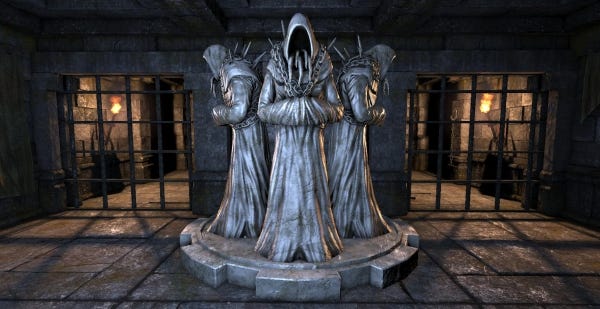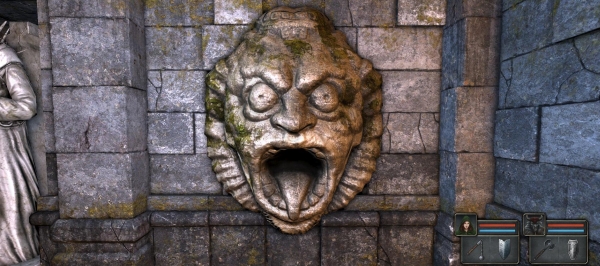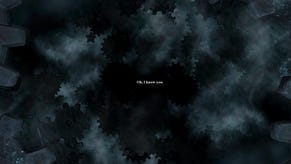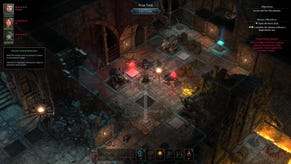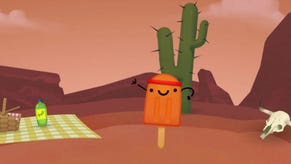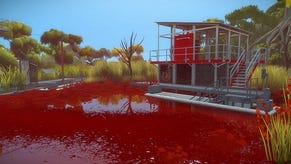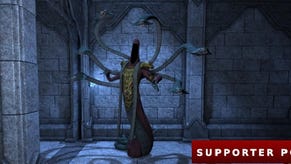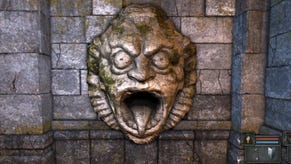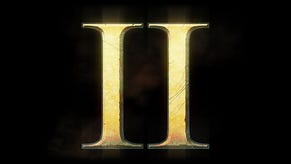Wot I Think: Legend Of Grimrock
Remastering The Dungeons
Almost Human's Legend Of Grimrock comes out a week today. I've finished it, and am here to tell you why it's bloody brilliant. Sometimes that's just what a review is for. Don't worry - we'll remind you next Wednesday that it's released, as we have more coverage planned. But now, here's Wot I Think.
The temptation to compare Legend Of Grimrock to Dungeon Master, perhaps just writing a review consisting of two columns of ticks and crosses, is one to be avoided. While the game is inescapably an overt tribute to the 1987 classic, right down to some intricate details, it's also its own entity, and very interesting in its own ways. Also, that would be somewhat unhelpful to those who never played FTL's Atari hit.
But boy are they similar.
At the start you can take a pre-packaged set of four characters to play as, or generate your own in a fairly standard RPG style. There are humans, minotaurs, lizardmen and insectoids, each with various stat advantages, and three classes, Rogue, Fighter and Mage. The game's played from a first-person perspective, but your squad is stood in a 2 by 2 formation, meaning you're going to want to think about whom you have at the front, and at the back. The front two are going to take the brunt of the attacks, while being able to dish out melee. The back two won't be able to reach if given a sword or mace, but are ideal for firing off spells or arrows. Get this balance wrong, and I'd imagine you could have a fairly tough time getting deep enough down the mountain in which you're trapped.
There's a story here, and while it's a loose, flappy skeleton, it begins, middles and ends. You're a group of four prisoners, who find "redemption" at the top of Mount Grimrock. I.e. you're thrown down a hole at the top, and left to die. The story is: get to the bottom, see if you can escape. There are a couple of twists and turns along the way. But primarily the focus here is on the action and the puzzles, and both are in huge amounts.
Part of the DM feel is movement, restricted to 90 degree turns, and advancing one tile at a time. If you've gone back to replay any Dungeon Master-inspired game of the late 80s/early 90s, you'll likely have noticed how peculiar this can feel when in first-person, leaping a square at a time. But rather impressively, Grimrock manages to give this a pleasing, smooth feel, without compromising on it at all. The beautifully-lit 3D chambers can be traversed reasonably quickly, with repeated taps, gliding pleasingly. Clearly the engine could offer completely free movement without a problem, but that would rather defeat the point. Monsters are restricted to the same, although as with DM move in real-time - there's nothing turn-based here. Which means combat is a frantic combination of trying to back away down corridors, stumbling to click on the correct runes to launch your next spell, firing off an arrow, while you're waiting for the cooldown on a figher's giant axe to be over. And then realising you've backed yourself into a dead end, and panicked, throwing your inventory at the enemy while waiting for an attack to become ready.
For the most part, enemies don't respawn (for the most part), so if you've cleared an area it's often safe. That's important. You'll want saferooms to dump heavy items, and most of all, to sleep in. Health can be regained by mixing potions, but the ingredients are incredibly rare for the bulk of the game, and sleep will be your primary means of getting better. But of course sleep near monsters and they're going to take a chunk out of you to wake you up. The other thing to be concerned about is food, which is again sparingly available. In fact, I'd say they get this perfectly right, making it feel like something you need to be worrying about, without ever making it tiresome. I always had just about enough. They don't drink, however, which is odd, but preferable.
Each floor of the in-mountain dungeons is packed with puzzles, and often really tough ones. Some are necessary for progress, others reveal bonuses and secrets, and it's mostly pretty hard to tell which is which until you find a new flight of stairs. Although the rule tends to be, the very toughest puzzles will be for extras, and can generally be walked past. But you shouldn't, because that's silly. You want cool goodies, right? Then solve!
They're again inspired by Dungeon Master's nature, most often involving teleporters. But this where the game really gets into its own, going far further with this concept, creating puzzles reminiscent more of Portal than Eye Of The Beholder. You'll have to start thinking with teleporters if you're going to figure a lot of them out. They're inventive, and they're often tough. In fact, in reviewing the game weeks before it's released, and thus lacking the option of spying a walkthrough or asking a chum for a hint, I've developed an amazing technique for solving the hardest elements. What you do is write an email to the developers saying, "I am completely stuck, and have no idea how to get past this." Click "send" and at that exact moment you'll notice what you were missing. It works without fail.
The combat's really tough too, with monsters able to kill you in a few swipes from very early on. That's nothing Dungeon Master didn't do, but gosh it's a bit of a surprise to have a game be so mean to you so early on. A great surprise, I should say - wow, games are too easy now, aren't they? You not only have to develop your own techniques for avoiding attacks, but also discover the most judicious application of your gang's collection of skills. And you're going to want to make sure you have a mage who's learning poison shields. Trust me.
One rather peculiar mistake the game makes is to fail to give you one rather crucial piece of information early on. If a member of your party dies, as far as you'll know for about the first three quarters of the game, it's game over really. You'll not last long with three, and unlike DM there's no introduction of wall alcoves that have the mysterious ability to bring people back to life. So you have to reload. Except, well, you don't - there's something else you could be doing, and it doesn't tell you that. I wish I'd known, and I wish that method were a little more commonplace in the early levels, as I think I would have approached the game very differently. As it was I was making ludicrously frequent use of the saves (maddeningly it doesn't have a quicksave button, despite it always being possible via the menu), when I could have added to my challenge by struggling with three until the next chance to revive. Oddly, that's a big motivation to replay it, this time with that extra difficulty.
However, you do get lots of other pieces of information, thanks to the notes left behind by a guy called Toorum, who realises he's not the first adventurer to be stuck down there, and won't be the last, so offers help to whoever comes after him. He partly fills in the story, and partly drops some handy tips for better enjoying things. And he has a few nice arch remarks about how odd it is that all the puzzles were reset by the time he reached them, if people had been through before.
(Actually, while that commentary is nice, and offers an explanation, the game does at one late point perhaps wander a bit too far into self-indulgence, with an entire section called The Tomb Of Designers, even featuring the four-man team's own names. That said, it also has one of my favourite puzzles in the game. And it comes right before the game's cleverest comment on itself at the very end.)
The other issue I'd cite is perhaps a little bit too much reliance on the need to find tiny hidden switches in walls for progress. Don't get me wrong. I'm not INSANE. Hunting walls for tiny hidden switches is exactly what the game should be offering, but for secrets. Not knowing why you can't get any further in a level because you missed one can occasionally grate.
But overwhelmingly it's a superb experience, characters levelling up at a perfect rate, agonising choices about which skill to improve becoming like knife wounds when you struggle to find the right type of weapon - the game is so cleverly sparing in its distribution of everything, so something as simple as finding a mace can feel like a mad victory. And talking of which, there are few games where I've felt so elated at figuring out a puzzle that I've punched my arms in the air and declared to the house, "I'm so brilliant at games!" Along with all this, it does a splendid job of creating a creepy atmosphere, and a deep sense of weirdness. Also, it understands the need to carry skulls.
There's more peculiarity arriving in your sleep, but I'll let you discover that. In fact, please discover it. This is a really splendid game. It's a great length, I'd guess at least 15 hours, and completely packed with challenges. There may only be three tile sets for the environments, but it feels constantly varied and interesting, and as I've said, offers a really entertainingly tough time. Also, it features the scariest bloody crabs I've ever seen in my phobic life, along with spiders, giants, and snails. Yes, snails.
The difficulty I mentioned can be enormously increased by invoking the game's "Old School Mode" where it will stop auto-mapping for you, meaning you need to dig out/print some squared paper, and meticulously sketch out every level if you're to have a clue where you're going. I didn't dare do this, possessing the navigation skills of a dizzy set of keys, and also relied on the in-game maps' option to let you add notes.
Does it directly compare to Dungeon Master, living up to those memories? Do you know, I've no idea. I played it when I was 10. But independently of its obvious spiritual father, it stands alone as a really great game that gripped me from top to bottom.
Legend Of Grimrock will be out on GOG.com, Steam, and via the developer's own site on the 11th April, and can be pre-ordered directly, or via GOG, now.
